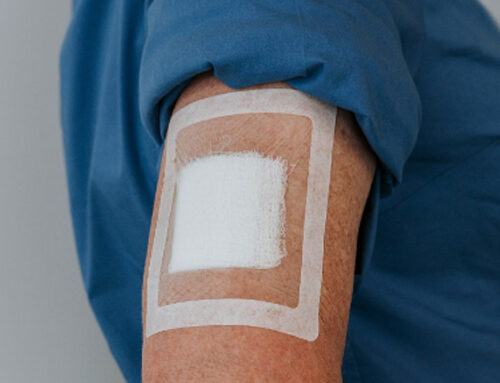Medical adhesives, an integral component of bandages, dressings and surgical tapes, play an important role in providing a barrier against infection. Unfortunately, their strength can often result in lacerations to the skin when dressings are removed. It’s estimated that skin tears caused by medical adhesives affect up to 1.5 million patients annually. The Payne-Martin skin tear classification system identifies the various degrees of skin tears and has been utilized since the early 1990s.
What Are Medical Adhesive Related Skin Injuries (MARSI)?
Medical adhesives can affect the integrity of the skin in different ways. While some patients may experience no reaction at all, others may experience a mild dermatitis as a result of chemical irritation and allergic reactions. However, some adhesives adhere strongly to the skin, and when dressings are removed, the bond between the adhesive and skin is such that the outer surface of the skin, tears or is damaged. Even when there’s no obvious skin damage, removal of dressings may cause partial separation of the epidermal layers.
While MARSI can affect anyone, certain portions of the population, such as the elderly, infants and infirm, are particularly susceptible. As people age, their skin becomes fragile and more likely to tear. Infants are vulnerable because their skin is thinner and not fully developed. Patients suffering from dermatological conditions are susceptible as are patients with certain medical conditions, including diabetes and hypertension, and those undergoing chemotherapy and radiotherapy.
Prevalence of MARSI in Healthcare Settings
While relatively few studies have been conducted, those that have been done indicate the prevalence of MARSI varies widely depending upon the patient’s age and condition. The following statistics were taken from several studies from different parts of the world:
- Outpatient wound care clinic: 5.8 percent
- General hospital population in Australia: 8-11 percent
- Acute surgical and cardiac care: 13 percent
- Elderly frail care: 16 percent
- Oncology patients in China: 29.8 percent
The incidence of MARSI varies considerably, but it can be deduced from these statistics that the risk is greater among patients with compromised immune systems (oncology), the elderly in frail care and surgical patients.
Different Types of Medical Adhesive Related Skin Injuries
Medical adhesive-related skin injuries can be divided into three types: mechanical , dermatitis and other.
1. Mechanical Injuries
These include injuries where the skin has obvious damage such as tearing, stripping or blistering.
- Skin (epidermal) stripping: The outer layer of the skin (stratum corneum) strips off when adhesive dressings are removed.
- Tension injury or blister: A small portion of the epidermis separates from the dermis due to the force needed to remove a strong adhesive dressing.
- Skin tear: One or more layers of skin tear due to the shear force exerted during removal of the dressing to form an open wound.
2. Dermatitis
Dermatitis is an inflammation of the patient’s skin. Two types of dermatitis are related to MARSI.
- Irritant contact dermatitis: A portion of the skin under the bandage is inflamed as a result of irritation caused by chemicals in the adhesive.
- Allergic dermatitis: An immunologic reaction to the adhesive, causing severe skin irritation. The affected area commonly extends beyond the bandage.
3. Other
These include inflammation and changes to the skin caused by moisture.
- Maceration: Wrinkled and gray discolored skin from moisture trapped under the bandage.
- Folliculitis: Small inflamed areas of skin around hair follicles caused by shaving and bacteria.
Avoiding MARSI
While there’s a need for strong medical adhesives, their residual strength is a primary cause of MARSI. Painful and uncomfortable, MARSI can lead to medical complications in patients who need the continual application of medical dressings. Current methodologies for preventing MARSI has centered on keeping the skin moist, using adhesive removers and other physical approaches that have not met with a great deal of success.
However, there is hope because a novel adhesive formulation that reacts with isopropyl alcohol to temporarily reduce the strength of the adhesive has been developed. This allows bandages to be removed without skin damage. This innovative product goes under the name of Comfort Release®.
To find out more about this exciting new product, contact us here to request a sample and discover how easy it is to avoid medical adhesive-related skin injuries for your patients.


